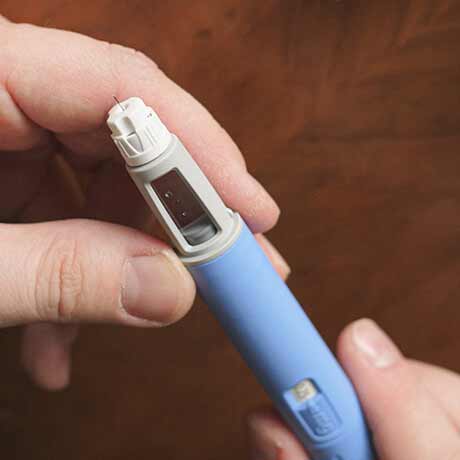How does Liraglutide affect the body?
Liraglutide is a GLP-1 analog. It was originally used to treat type 2 diabetes, but now can be prescribed to help people lose weight too.

It primarily works by controlling blood sugar levels, which makes it an effective diabetes treatment. It also slows down digestion. This reduces your appetite and helps you eat less, meaning it can help people lose weight.
However, like all prescription medications, it can cause side effects.
How common are side effects whilst on Liraglutide?
Side effects are rated based on how common they are. This is based on findings from clinical trials.
- Very common - occur in more than 1 in 10 people
- Common - occur in more than 1 in 100 people but less than 1 in 10
- Uncommon - occur in more than 1 in 1000 people but less than 1 in 100
- Rare - occur in more than 1 in 10,000 people but less than 1 in 1000
- Very rare - occur in less than 1 in 10,000 people
These terms appear in most patient information leaflets - make sure you read them when you start a new medicine.
What are the most common side effects of Liraglutide?
See a summary of the most common side effects below.
| Very common side effects |
Common side effects |
- feeling sick (nausea)
- being sick (vomiting)
- diarrhoea
- constipation
|
- indigestion & heartburn
- bloating, wind and stomach discomfort
- inflammation in the stomach lining (gastritis)
- feeling weak or tired
- insomnia
- dizziness
- change in taste
- gallstones
- hypoglycaemia
- increased levels of pancreatic enzymes
|
Hypoglycaemia
Hypoglycaemia, or hypo, is a condition where your blood glucose levels drop very low.
Liraglutide can affect your blood sugar levels, so hypo can be a common side effect. People who take medicines for diabetes as well as Liraglutide are more at risk of developing hypo.

Symptoms of low blood sugar include:
- cold sweat
- cool, pale skin
- headache
- feeling weak
|
- feeling anxious or confused
- difficulty concentrating
- shakes
|
If you notice these symptoms, you should check your blood sugar levels. Your doctor will instruct you what to do if you experience low blood sugar.
What are the uncommon side effects of Liraglutide?
Below are the uncommon side effects.
| Uncommon side effects |
- dehydration
- mild allergic reaction (e.g. skin rash)
- feeling unwell
- gallbladder inflammation
- increased heart rate (tachycardia)
- pancreatitis
- hives (urticaria)
- generally feeling unwell (malaise)
|
The majority of these side effects are typically mild. In most cases, side effects should go away on their own after several weeks.
However, in the rare case that these side effects persist or get worse, you should consult your doctor for advice.
Gallbladder problems
Some people may experience gallbladder problems such as gallstones.
Gallstones are small stones made up of cholesterol. They form in the gallbladder and can cause discomfort if they become lodged in a duct inside your gallbladder.
Symptoms may include persistent stomach pain, yellowing of the skin and eyes (jaundice) and a high temperature.
They can cause complications such as gallbladder inflammation (cholecystitis), so see your doctor if you notice any symptoms.
Pancreatitis
Inflammation of the pancreas is known as pancreatitis and can rarely occur in patients taking Liraglutide. It is more likely if you take too much of it.

It is often caused by gallstones, another Liraglutide side effect. Yet, the link between Liraglutide and pancreatitis needs more research.
The defining symptom of pancreatitis is severe stomach pain that won’t go away. The pain may radiate to your back. You may also experience nausea and vomiting.
It is a serious condition and can be life-threatening if left untreated. So you should seek medical attention if you notice symptoms.
What are the rare side effects of Liraglutide?
You are unlikely to experience any rare side effects of Liraglutide. The manufacturer estimates that around 1 in 1000 users will develop any, that’s a 0.1% chance.
Regardless of the low risk, you should still learn what they are in the rare event you develop any side effects.
If your doctor thinks you are more at risk of any of these adverse effects occurring, they will advise you not to take this medication.
Serious allergic reaction
Some people may experience a serious allergic reaction (anaphylaxis) when using Liraglutide for the first time.
Signs of an allergic reaction may include:
- difficulty breathing or swallowing
- swelling of the face, throat or tongue
- very rapid heartbeat
If you experience any of these signs, stop using Liraglutide and seek emergency medical attention.
Depression
Rarely, patients report experiencing depressive or suicidal thoughts while on Liraglutide If you have a history of mental illness, your doctor may advise you not to take this medication.
If you start to feel depressed whilst taking it, talk to your doctor as soon as possible.
Kidney problems
Another rare side effect of Liraglutide is kidney problems like kidney failure.
This can occur with Liraglutide because the medication can make you very dehydrated from vomiting and diarrhoea.
Severe dehydration can rarely lead to kidney problems, even in people who have not had them before. Staying hydrated while on Liraglutide is the best way to prevent it.
If you have severe diarrhoea and vomiting that doesn’t go away, contact your healthcare provider immediately.
Thyroid tumours
There is a slight risk of developing thyroid tumours and thyroid cancer whilst on this medication.
This is based on studies conducted where they found the medication caused thyroid tumours in rats and mice. However, it is not known whether the medication would cause it in humans.

If you notice any of the following symptoms, make an appointment with your doctor:
- swelling or a lump in your neck
- voice hoarseness
- difficulty swallowing
- shortness of breath
These symptoms may not be thyroid cancer. However, you should get them seen by a healthcare professional.
When do side effects occur?
You’re most likely to experience side effects when you start taking treatment. This is because your body is still adjusting to treatment.
Common side effects should fade after a few weeks of treatment and your body has adjusted.
When you increase the dose of Liraglutide, there is a chance you may experience side effects. However, they will likely be milder and last for less time than when you first experienced side effects.
How do I manage Liraglutide side effects?
Common side effects can be managed with some simple tactics. The most common side effects affect digestion, which can be managed with some simple lifestyle changes.

To reduce the risk of digestive side effects, you should:
- eat slowly
- eat smaller portion sizes
- eat bland, low-fat foods to help nausea (e.g. crackers, toast or rice)
- eat foods that contain water (e.g. soup)
- not lie down after you eat
- try and get some fresh air
- drink lots of fluid where possible
Your doctor or pharmacist can also recommend over-the-counter medicines to help with side effects.
- rehydration salts to help keep you hydrated
- antacids to reduce any heartburn or indigestion
- anti-sickness tablets to reduce any nausea
If you experience persistent side effects, you should consider lowering the dose of Liraglutide. In the worst case, your doctor may recommend you not to use Liraglutide.
Main takeaways
The most common side effects of Liraglutide are nausea, sickness and digestive issues.
Most people will only experience these side effects for a few weeks as their body gets used to the medicine. But, there are some simple ways to manage common side effects.
The risk of serious side effects is low. However, you should not take this medication if you are at an increased risk. Ask a healthcare professional if you are not sure.















